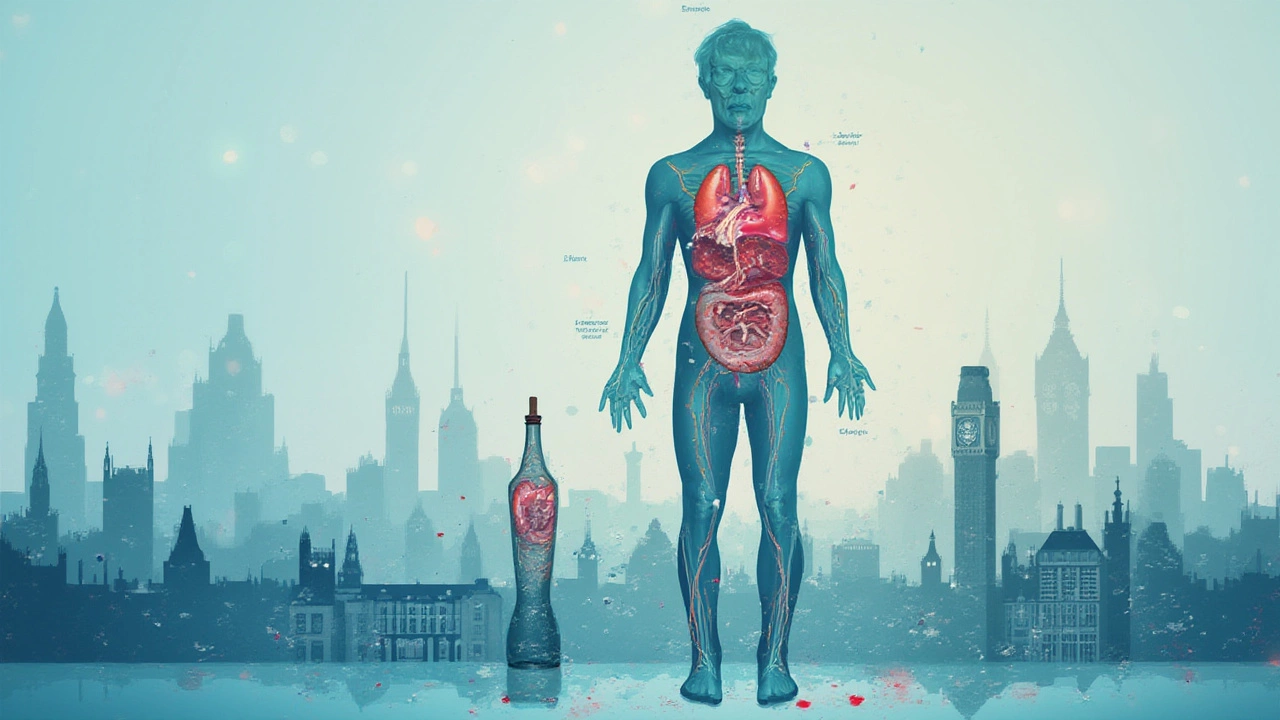Ever thought about what two decades of steady drinking actually does to your body? It’s not just about the hangovers or the foggy mornings. The real drama unfolds out of sight—inside your organs, your brain, and even deep down in your cells. Some folks can go years without obvious signs, others crash hard and early. Here’s the unfiltered truth about what two decades with a drink in hand really mean.
The Long Game: What 20 Years of Drinking Does to Your Body
You might not notice at first. Maybe you feel fine, or maybe you chalk up that morning lethargy and random aches to getting older. But your body keeps a quiet tally. Twenty years of regular alcohol—whether that's beers after work, weekend wines, or nightly spirits—gradually rewires the way things run inside.
The liver cops most of the punishment. It acts like a brave bouncer, filtering out toxins. But alcohol keeps marching through its doors. You start with fatty liver, which might not have symptoms. Then things can snowball into hepatitis (liver inflammation) and eventually cirrhosis—a fancy word for a liver basically turning into scar tissue. Over two decades, the risk stacks way higher, especially if you're drinking more than the safe limits (and most of us underestimate our pours). In Australia, about 20,000 people a year end up in hospital for alcohol-related liver disease. Just one shocking stat: after 20 years of daily heavy drinking, close to one in three people develops serious liver scarring.
The heart doesn't get off easy, either. Chronic booze ups your blood pressure, weakens the heart muscle (ever heard of alcoholic cardiomyopathy?), and messes with the rhythm your heart needs. Over 20 years, your odds of heart failure or irregular beats shoot up. Even a couple of drinks most nights have been linked to real increases in heart attack risk.
Don’t forget your gut. Alcohol can inflame the stomach lining, trigger acid reflux, and over time, increase your risk of nasty stuff like stomach or oesophageal cancer. People often think only super-heavy drinkers get into trouble, but cancer risk starts rising even at moderate levels if you play the long game.
On a scarier note: chronic alcohol intake strips away at your immune system, making you an easier target for bugs and viruses. Twenty years of steady drinking means you get sick more often, take longer to recover, and can sometimes miss the early warning bells on stuff like cancer.
Your Brain After 20 Years with Alcohol
This one’s a bit confronting. If you could peek inside the mind of someone after 20 years of regular booze, you’d see changes both big and subtle. Alcohol is a sneaky thief: it quietly chips away at your brain tissue. Long-term drinkers show actual shrinkage in parts of the brain linked to memory and learning—so that forgotten name or missed anniversary isn’t just age.
Decision making, focus, and impulse control all take a hit. People who’ve been drinking for decades find their thinking just isn’t as sharp. There’s a higher risk of depression or anxiety, and a much greater chance of developing alcohol-related dementia—this isn’t rare, either, especially in people who start young and keep going. Even among moderate drinkers, MRI scans sometimes pick up tiny signs of brain damage after just 10 years.
Alcohol also messes with sleep big time. Sure, a glass of red might help you conk out, but decades of drinking steals your ability to reach restorative deep sleep. That leads to fatigue, brain fog, and a short fuse—sometimes the same stuff people blame on “midlife.”
Let’s talk nutrition too. Alcohol blocks your gut from absorbing key vitamins, especially B12 and thiamine. Over the years, this can lead to memory loss, nerve damage, and muscle weakness. Ever heard of Wernicke–Korsakoff syndrome (sometimes called “wet brain”)? That’s vitamin deficiency due to long-term heavy drinking, and it can leave people permanently confused and forgetful.

How Your Day-to-Day Life Changes After 20 Years
It’s not just medical charts and blood tests—it’s how you feel on the daily. After 20 years, regular drinkers often notice sluggishness, morning headaches, and that nagging feeling of never being truly rested. These are the small signals your body sends that something’s gone sideways.
Personal relationships can suffer, too. Regular drinking easily turns into dependence, which can put stress on family and friends. You might become irritable without your nightly drink, or start skipping social things that don’t involve alcohol. This can sneak up on people—often, they don’t notice until someone else points it out.
Work performance dips. Twenty years of drinking don’t just make you tired—they can chip away at your memory and decision-making skills. Missed deadlines, forgotten meetings, and poor attention to detail aren't just a coincidence when you look at long-term habits.
There’s also the issue with sex and hormones. Chronic alcohol use reduces testosterone in men, and can lower fertility for everyone. Sexual dysfunction is pretty common after years of steady drinking, which is a topic lots of people don’t want to talk about, but wish they’d known earlier.
Here’s something not everyone realises: long-term alcohol use often goes hand-in-hand with poor diet and reduced exercise. It's hard to hit the gym or cook healthy meals with a hangover, so you end up stuck in a loop. That can snowball into weight gain, diabetes, and higher cholesterol. Over 20 years, those risks add up fast.
Early Warnings and Silent Damage: Why You Might Not Notice
You’d think your body would protest loudly, but for most people, the warning bells are nothing more than mild fatigue or feeling ‘off’. The liver, for example, can still function even when 80% of its cells are damaged. That’s why “silent damage” builds up—it’s like putting off the car service until it breaks down on the highway. Blood pressure creeps up year after year, headaches become a regular visitor, but it’s easy to blame stress or age instead of wine or beer.
Your body tries to adapt, so you build up tolerance. You might think you “handle your drink,” but really your body has changed—your liver produces more enzymes, your brain rebalances its chemistry. You need more alcohol for the same buzz, which just speeds up the damage. After years, you may not feel drunk, but the health risks keep piling up.
There's the “beer belly” effect, too. Regular drinkers often gain visceral fat—the deep stuff around your organs. This kind of fat increases the risk of heart disease, stroke, and type 2 diabetes. It’s not always obvious if you’re otherwise slim, either.
Family history can make things a lot worse. If your parents struggled with alcohol or had liver trouble, your risks go up even more. Some people have genetic differences in alcohol metabolism (like variations of the ADH and ALDH2 genes), making everything from liver damage to hangovers more severe. After 20 years, their risk curves look very different from their mates who started at the same time.
For concrete numbers, scientists published a table comparing health issues in long-term drinkers:
| Condition | 20-Year Alcohol User Prevalence | General Population Prevalence |
|---|---|---|
| Liver Cirrhosis | 28% | 1.1% |
| Hypertension | 41% | 24% |
| Alcohol-Related Cancer Risk | +400% increase | Baseline |
| Alcohol Dependency | 21% | 3.5% |
| Alcoholic Dementia | 16% | 1.4% |

Can You Undo the Damage? And What Actually Helps?
This is the question everyone asks when they hit a milestone birthday or start worrying about aches that won’t go away. The truth? Some damage can be undone, some can’t—but it’s rarely too late to turn the ship around. The liver can regenerate remarkably well if you stop drinking before cirrhosis sets in; mild to moderate cases of fatty liver often clear up within months of quitting alcohol.
The risk for many types of cancer and high blood pressure drops pretty quickly after stopping. About a year after quitting, your risk of heart attack falls by almost half, and within five years, it's close to that of someone who never drank much. Some brain function improves, too—cognitive fog usually gets better, and sleep tends to return to something that actually feels restful.
For folks who’ve built their routines around alcohol, quitting isn’t just about willpower. New research from 2023 suggests support groups (both online and in-person), exercise, and professional counselling boost your odds of success by 60%. Multivitamin supplements can help restore what’s been lost, especially B vitamins. If you find yourself struggling, remember: it’s common to need more than one attempt. Doctors in Sydney often recommend seeing a GP before going cold turkey, since withdrawal can sometimes be dangerous after long-term use.
Practical tips for cutting down or stopping:
- Set definite drink-free days every week (at least 3—more is better)
- Replace the “trigger” drink with something non-alcoholic but satisfying (like a good ginger beer or a citrus soda)
- Tell people you trust so they can help keep you accountable (even quietly, on group chats or in-person)
- Track your drinking with a free app—most are easy and anonymous
- If you slip up, don’t give up; it’s about progress, not perfection
And don’t be afraid to speak to a doctor. In Australia, GPs see this all the time, and they won’t judge. Liver tests, blood pressure checks, and a chat about your goals are often covered by Medicare. The most common regret people share isn’t about nights they skipped out drinking—it’s that they wish they’d made a change earlier.
One last thing: the science is clear that long-term alcohol effects stack up way faster than you expect, but turning things around is always worth it, no matter your age or how long you’ve been in that old groove. The body and brain are surprisingly good at second chances—even after 20 years.


